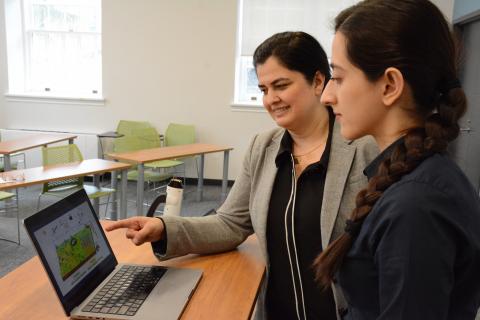
Advancing artificial intelligence (AI) research to benefit agri-food systems, along with educational programs that contribute to using these technologies, are the two foundational pillars of a new initiative announced in the College of Engineering and Physical Sciences at the University of Guelph.
Artificial Intelligence for Food (AI4Food) seeks to pioneer research and learning at the intersection of responsible, data-driven technologies and AI in our agricultural and food systems.
“Our overarching objective is to foster innovation and also to address regional and multi-jurisdictional challenges,” says Dr. Rozita Dara, Associate Professor in the School of Computer Science and the Director of AI4Food for a three-year term.
“There is a lack of integration within the food systems because the ecosystem is so fragmented,” says Dara. “This raises a number of challenges for new AI-driven agri-food technologies including adoption and integration and concerns about trust, governance, cybersecurity and even data sharing and quality.”
Through collaborative research, AI4Food will leverage AI methods to improve resilience, safety, production, processing and sustainability in national and international agri-food systems. Research will also address challenges to adopting these technologies, such as ethical and responsible innovation, data and technology governance, and societal limitations. Critical to the initiative are partnerships Dara aims to build with international organizations, industry, research institutions, NGOs and government agencies.
The education pillar will complement the research efforts by training interdisciplinary experts, disseminating findings, proposing innovative solutions and implementing new guidelines and policies.
AI4Food builds on U of G’s artificial intelligence reputation that has grown in recent years, amplified in 2018 by the launch of the Centre for Advancing Responsible and Ethical AI (CARE-AI).
AI4Food is aimed at spearheading diverse activities such as networking events, workshops and conferences, educational program and research initiatives in collaboration with the partner organizations.
“By collaborating with diverse groups of experts and developing novel technology solutions, policies and standards, we hope to improve the slow adoption of AI-based agri-food technologies,” says Dara. “We also aim to provide unique learning experiences for students and researchers, and training for end-users of these products.”